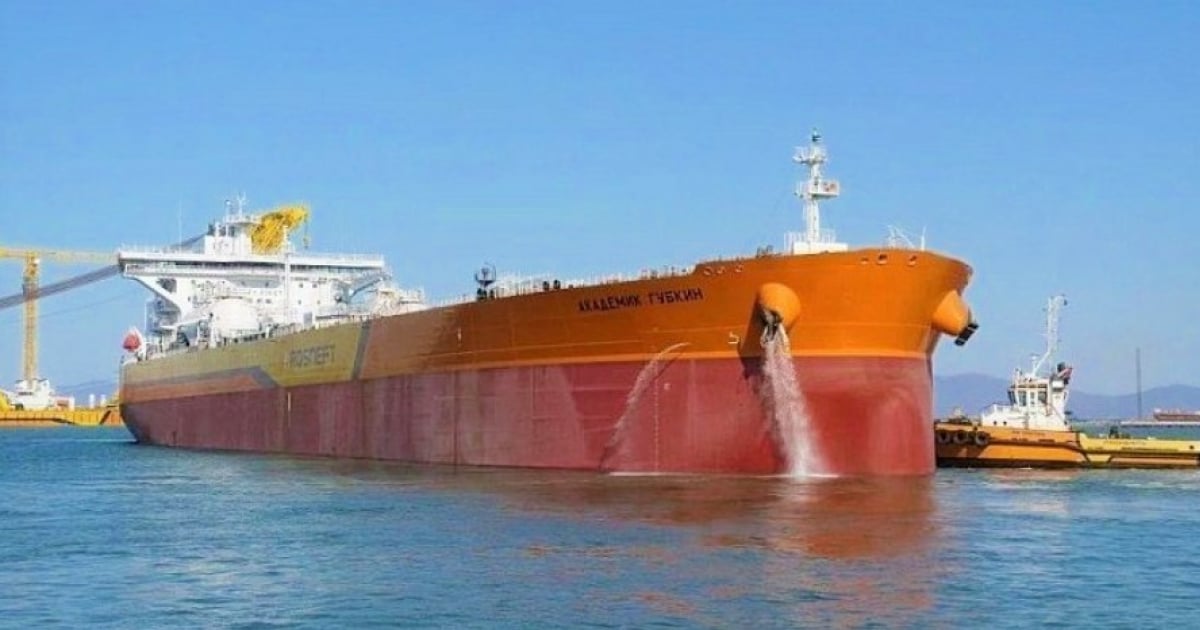Russia exported Urals crude to Cuba in January aboard the tanker Akademik Gubkin, a vessel sanctioned by the United States, and the tanker is expected to arrive on the island in a few days.
The Akademik Gubkin was loaded on January 29 with 100,000 tons of crude oil at the Russian port of Ust-Luga, in the Baltic Sea, according to a report by Reuters.
Currently, the cargo is traversing the Atlantic and is expected to arrive at the Cuban terminal in Matanzas on February 19.
Capture from marinetraffic.com
In the tracking platforms Marine Traffic and Vesselfinder, the Akademik Gubkin does not show a destination port, a common tactic in fuel shipments from Russia to Cuba.
Capture of vesselfinder.com
The vessel is operated by Rosnefteflot, the maritime transportation division of Rosneft, a Russian state-owned oil company responsible for the distribution of Ural crude oil.
This operation reflects Moscow’s strategy to diversify its buyers through its parallel fleet of oil tankers, according to data from London Stock Exchange Group (LSEG), a global financial data and market infrastructure company.
A ship under U.S. sanctions
The Akademik Gubkin (IMO 9842190) was added on January 10 of this year to the sanctions list of the Office of Foreign Assets Control (OFAC) of the U.S. Department of the Treasury, in the section related to Rosnefteflot.
The Biden Administration imposed these restrictions just before leaving office as part of a sanctions package against the Russian oil industry, affecting 183 ships, including vessels from the so-called “shadow fleet.”
This fleet consists of ships used to circumvent international restrictions on oil trade, facilitating shipments to countries that are evading Western sanctions.
Decline in imports of Russian crude oil
According to LSEG data, in 2024, Cuba imported approximately 100,000 tons of Russian crude, representing a significant decline compared to 200,000 tons in 2023 and 600,000 in 2022.
The decrease in these shipments coincides with the implementation of the total embargo by the European Union on Russian crude in December 2022, which forced Moscow to redirect most of its maritime exports to Asia and other markets.
Tourism for oil and financial negotiations
In recent months, Rosneft organized flights to Cuba for hundreds of company employees, who visited the island under a tourism-for-oil scheme approved by Moscow and Havana.
Meanwhile, the Cuban ambassador in Russia, Julio Antonio Garmendía, announced at the beginning of this year that both governments were negotiating a credit of 60 million dollars for the purchase of Russian fuel. However, to date, it has not been confirmed whether the agreement was finalized.
The sanctions imposed by the United States aim to impact the Kremlin’s revenue flow, which largely relies on hydrocarbon exports to finance its invasion of Ukraine.
However, despite the restrictions, Russia continues to use its network of sanctioned tankers to maintain its exports and strengthen its ties with strategic allies such as Cuba.
Meanwhile, the island is more than ever short on fuel, as the country faces an imminent energy collapse, a situation particularly worsened in recent days following the shutdown of unit 1 of the Felton Thermoelectric Plant from the National Electric System (SEN) due to a breakdown that will keep it out of service for about 20 days.
Frequently asked questions about the shipment of Russian oil to Cuba and the energy crisis on the island
Russia sends crude oil to Cuba aboard the Akademik Gubkin, which has been sanctioned by the United States, as part of its strategy to diversify its buyers and strengthen ties with strategic allies like Cuba. The operation aims to maintain Russian exports despite international sanctions.
Cuba is facing a severe energy crisis, exacerbated by a shortage of fuel and the deterioration of electrical infrastructure. The island suffers from prolonged blackouts and relies on crude oil imports from allied countries such as Russia and Mexico.
The U.S. sanctions imposed on vessels like the Akademik Gubkin aim to limit the flow of revenue to the Russian government. However, Russia is using its sanctioned fleet to continue exporting crude oil to Cuba, thus undermining the impact of the sanctions.
Mexico has sent oil to Cuba to alleviate its energy crisis. The shipment of the vessel Vilma with 400,000 barrels of crude is part of the humanitarian aid provided by Mexico, in the context of widespread blackouts and failures in the electrical infrastructure.
